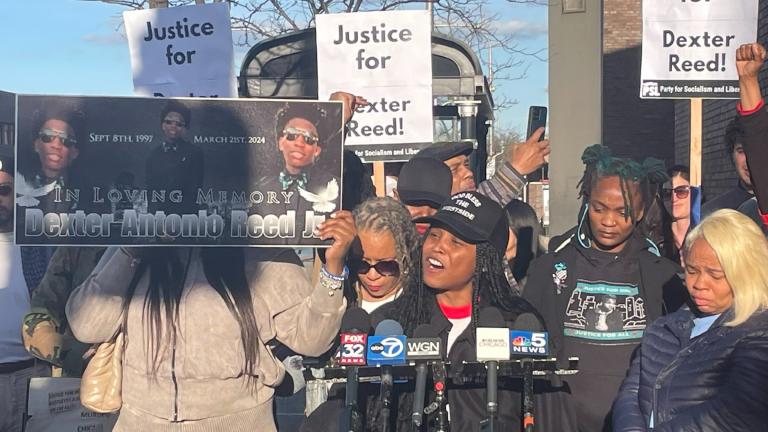Black women and girls in the U.S. are disproportionately at risk for abuse, exploitation and homicide. In the Chicago area, an alarming number of Black women have been killed and their murders have gone unsolved. And as even more Black women and girls have gone missing, community organizations say local law enforcement, government and the news media are not doing enough.
On Sept. 1, Cook County Sheriff Tom Dart announced the formation of the Missing Persons Project. The initiative assigns a new team of detectives to work on longtime missing persons cases.
Angela Martin-Fields, whose mother Viola Martin has been missing since 2009, spoke at the announcement of the project.
“My mom did have a drug problem but she was clean for five years,” Martin-Fields said. “We thought it was probably just a little relapse, like three days, that’s it … we just left her house from Christmas and she was going to my sister’s house … to take her a plate because she just got out the hospital. After that, we didn’t hear from my mom or see our mother again.”
The Rev. Robin Hood, a founding member of the West Side community organization Mothers Opposed to Violence Everywhere, or MOVE, says that cases like Martin’s, in which a victim might have a history of substance abuse or sex work, affect the way law enforcement, the media and the public perceive them. Hood is working on a documentary about the subject and says that while many of the victims had nothing to do with drugs or sex work, those factors should not matter when it comes to how their cases are managed.
“It should not make a difference because that’s somebody’s mother, sister, daughter, wife, cousin, neighbor, a loved one,” said Hood. “To say, well, they were sex workers and they didn’t deserve to live is so inhumane.”
Another contributing factor to the ongoing crisis is a lack of focused, individual media attention, says Nikki Patin, director of community engagement for the Chicago Alliance Against Sexual Exploitation, or CAASE.
“It’s the fact that we have so many women — I believe 75 that are missing and murdered since 2001 — and we tend to think of them as one big group, which means that we don’t specifically say folks names out loud,” said Patin. “What I find ironic is that the media will report on the lack of media attention, but we still are not getting those individual stories of women and girls that have gone missing and murdered.”
Law enforcement is also culpable in how these cases are managed, say Hood and Patin.
“When you are a police officer and you can show up to a situation that has a little Black girl at the center and you can look at her and say, ‘it’s not worth making the arrest’ or ‘it’s not worth the investigation’ or ‘I think it was consensual.’ These are all things that I’ve heard throughout my time doing this work,” Patin said.
“Law enforcement needs to answer the phones,” said Hood. “The detectives that are assigned to the cases of the missing girls and women, they need to answer the phone. If you are white, they investigate those murders. Black families have to deal with the fact that law enforcement don’t find this at the top of their, of the food chain, so to speak.”
CAASE and MOVE are two of the community organizations partnering in Chicago to address the exploitation and trafficking of Black girls. The coalition is called Protect Black Girls, and was the brainchild of activist and sex trade survivor Brenda Myers-Powell. Patin says that while the coalition is still in its early stages, it's already working on cases of exploitation and trafficking across the country.
“I think it’s important for people to know that we’re out here doing this work because the perception is that nobody cares,” Patin said. “There’s a big group of us who care about this and have been actively working as part of this coalition.”








